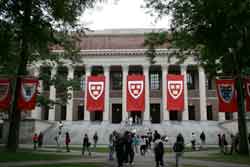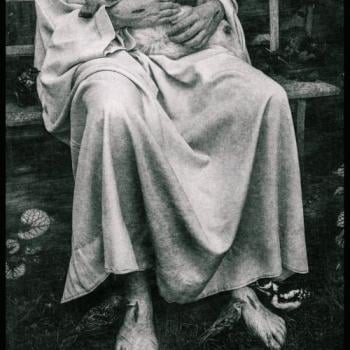 Deep in the bowels of McCosh Hall, the competition had not yet ended. After spending the day delivering direct examinations and closing arguments for my Harvard mock trial team, I was outside, biding time in the brisk weather of a winter's night in Princeton, New Jersey. I had had enough of watching courtroom quarrels all day -- it was time for a moment of tranquility. It was time that I could use to think -- to consider why I was thousands of miles away from my family, why I was in that mock trial competition, and why many of the participants had such a cutthroat desire to win. I stared up at the stars, which I could faintly see through the streetlights around me. And then my gaze shifted downward to a massive stone church -- Princeton's famous University Chapel. Surprised that the doors were open and the lights lit so late on a Saturday night, I walked inside. Despite my initial amazement at the grandeur of the architecture, I felt a striking loneliness -- I was by myself in a chamber meant for two thousand people. So I went into a small prayer room that had a couple of pews and knelt down, trying to ameliorate my solitude with the comfort and presence of God. I must confess, I don't often open the Bible to pray, but I did so that night for some reason. And I opened it to Psalm 41 -- not knowing the late-night lesson I had coming. On the left side of the page, I read:
Deep in the bowels of McCosh Hall, the competition had not yet ended. After spending the day delivering direct examinations and closing arguments for my Harvard mock trial team, I was outside, biding time in the brisk weather of a winter's night in Princeton, New Jersey. I had had enough of watching courtroom quarrels all day -- it was time for a moment of tranquility. It was time that I could use to think -- to consider why I was thousands of miles away from my family, why I was in that mock trial competition, and why many of the participants had such a cutthroat desire to win. I stared up at the stars, which I could faintly see through the streetlights around me. And then my gaze shifted downward to a massive stone church -- Princeton's famous University Chapel. Surprised that the doors were open and the lights lit so late on a Saturday night, I walked inside. Despite my initial amazement at the grandeur of the architecture, I felt a striking loneliness -- I was by myself in a chamber meant for two thousand people. So I went into a small prayer room that had a couple of pews and knelt down, trying to ameliorate my solitude with the comfort and presence of God. I must confess, I don't often open the Bible to pray, but I did so that night for some reason. And I opened it to Psalm 41 -- not knowing the late-night lesson I had coming. On the left side of the page, I read:
For the leader. A psalm of David. / Happy those concerned for the lowly and poor; when misfortune strikes, the LORD delivers them. / The LORD keeps and preserves them, makes them happy in the land, and does not betray them to their enemies / "For my integrity you have supported me and let me stand in your presence forever. Blessed be the LORD, the God of Israel, from all eternity and forever. Amen. Amen." (Psalm 41, NAB).
It was the perfect prayer -- a prayer that came directly from God. I had done all my college schooling up to that point at Harvard, but I think the single greatest lesson I've learned in college thus far took place in a church hundreds of miles away.
While I've heard much about how to "become a great leader" and how to take control and inspire others to "follow you," I quickly understood that in the eyes of God a leader is someone who is faithful to Him-- someone who upholds morality; who simply has integrity. It's not enough to ascribe to a moral code in some context-less vacuum. There will be times when "misfortune strikes," when enemies appear, and even times when friends whom we trusted turn on us. But such times are tests of our integrity, moments when our faith in the righteousness of God will be challenged; when we are tempted to think about us instead of Him. The true leader is a leader not for the sake of himself, but for the sake of others and for the sake of what's right.
This scripture alludes to the various "tests" we will encounter in our lives, as leaders on Earth and followers of Christ. As Chiduzie Madubata writes, these tests are always learning experiences, moments in which we discover more about what is good and how to pursue it. God is not so concerned with some Psychology of Leadership exam we're taking next week. Indeed, there are more enduring, more important things that will enable us to pass the most difficult tests. Such examinations of our moral caliber and faith in God can come at any time and from anywhere. And perhaps they will continue for the duration of our lives.
Considering this idea of the true "tests," we should now try to consider how it applies to young Christians who are constantly tested on the seemingly trivial things in college. Some might believe it is more important to spend time developing our soul; learning how to be a good Christian, rather than brushing up on astrophysics. Indeed, my real education -- the many tests of my integrity and faith -- may just await me years beyond Commencement.
What is the relationship between a college education and the education of our souls? I often look to G. K. Chesterton for advice on such matters (and most recently, to Father James V. Schall, S.J., who has graced the pages of the Ichthus). Not surprisingly, Chesterton wonderfully describes the purpose of education for a Christian in his essay on "The Superstition of School":
The moment men begin to care more for education than for religion they begin to care more for ambition than for education...Education ought to be a searchlight given to a man to explore everything, but very specially the things most distant from himself. Education tends to be a spotlight; which is centered entirely on himself. Some improvement may be made by turning equally vivid and perhaps vulgar spotlights upon a large number of other people as well. But the only final cure is to turn off the limelight and let him realize the stars.




